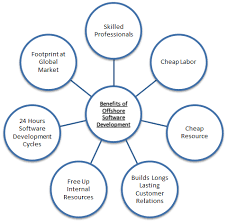Unlocking Innovation: The Power of Global Software Development
The Advantages of Global Software Development
In today’s interconnected world, global software development has become a common practice for many companies seeking to leverage talent and resources from around the globe. This approach involves collaborating with teams located in different countries to create high-quality software solutions. Here are some of the key advantages of global software development:
Access to Diverse Talent Pool
One of the primary benefits of global software development is access to a diverse talent pool. By working with developers and engineers from various regions, companies can tap into a wide range of skills and expertise that may not be readily available locally. This diversity often leads to innovative solutions and fresh perspectives on problem-solving.
Cost-Effectiveness
Global software development can also be cost-effective for companies looking to reduce expenses without compromising on quality. Outsourcing certain tasks or projects to countries with lower labor costs can result in significant savings while maintaining high standards of work.
Around-the-Clock Development
With teams distributed across different time zones, global software development allows for continuous progress on projects. Developers in one location can hand off work to team members in another region, ensuring that work is being done around the clock. This can lead to faster project completion and quicker time-to-market for products.
Cultural Exchange and Collaboration
Collaborating with teams from diverse cultural backgrounds fosters creativity and innovation. Different perspectives and approaches to problem-solving can result in more robust solutions that cater to a global audience. Additionally, working with international teams promotes cultural exchange and understanding among team members.
Challenges of Global Software Development
While there are numerous benefits to global software development, there are also challenges that companies may face. These include communication barriers due to language differences, varying work cultures, and potential security risks associated with sharing sensitive information across borders.
In Conclusion
Global software development offers many advantages for companies looking to expand their capabilities and reach a broader market. By leveraging talent from around the world, businesses can create innovative solutions, reduce costs, and accelerate project timelines. While challenges exist, proper planning and communication strategies can help overcome these obstacles and ensure successful collaboration across borders.
7 Essential Tips for Effective Global Software Development
- Establish clear communication channels among team members.
- Define and adhere to coding standards for consistency.
- Implement version control to track changes and collaborate efficiently.
- Schedule regular meetings to discuss progress, challenges, and goals.
- Consider time zone differences when planning meetings and deadlines.
- Encourage cultural sensitivity and awareness among team members.
- Use collaboration tools like project management software for better organization.
Establish clear communication channels among team members.
Establishing clear communication channels among team members is crucial in global software development. Effective communication ensures that all team members are on the same page regarding project goals, timelines, and tasks. By utilizing tools such as video conferencing, messaging platforms, and project management software, teams can overcome geographical barriers and collaborate seamlessly. Clear communication fosters transparency, reduces misunderstandings, and promotes a cohesive team dynamic essential for successful global software development projects.
Define and adhere to coding standards for consistency.
In global software development, it is crucial to define and adhere to coding standards to maintain consistency across teams and projects. Establishing clear guidelines for coding practices ensures that all developers follow the same set of rules, leading to uniformity in code structure, formatting, and documentation. Consistency in coding standards not only improves code readability but also facilitates collaboration among geographically dispersed teams by promoting a shared understanding of best practices. By adhering to coding standards, organizations can enhance code quality, streamline development processes, and ultimately deliver more reliable and maintainable software solutions on a global scale.
Implement version control to track changes and collaborate efficiently.
Implementing version control is a crucial tip in global software development to track changes and collaborate efficiently. By utilizing version control systems such as Git or SVN, teams can easily manage code modifications, track the history of changes, and work collaboratively on the same codebase without conflicts. Version control helps streamline the development process, improve team coordination, and ensure that everyone is working on the most up-to-date version of the software. This practice not only enhances productivity but also facilitates effective communication and transparency within distributed teams.
Schedule regular meetings to discuss progress, challenges, and goals.
To ensure effective collaboration and project management in global software development, it is crucial to schedule regular meetings to discuss progress, challenges, and goals. These meetings provide an opportunity for team members from different locations to align on project milestones, address any obstacles or bottlenecks, and reaffirm shared objectives. By fostering open communication through regular check-ins, teams can stay coordinated, motivated, and focused on achieving successful outcomes in the development process.
Consider time zone differences when planning meetings and deadlines.
When engaging in global software development, it is essential to consider time zone differences when scheduling meetings and setting deadlines. By being mindful of the varying working hours of team members across different regions, companies can ensure effective communication and collaboration. Planning meetings at times that accommodate all parties involved and setting realistic deadlines that account for potential delays due to time zone disparities can help streamline project progress and foster a more cohesive team dynamic.
Encourage cultural sensitivity and awareness among team members.
Encouraging cultural sensitivity and awareness among team members is crucial in global software development. By fostering an environment where team members respect and appreciate each other’s cultural differences, communication is enhanced, collaboration becomes more effective, and creativity flourishes. Understanding and valuing diverse perspectives can lead to more innovative solutions that cater to a broader audience. Embracing cultural sensitivity not only strengthens team dynamics but also promotes a harmonious and inclusive work environment where every individual feels valued and respected.
Use collaboration tools like project management software for better organization.
To enhance the efficiency and organization of global software development projects, it is highly recommended to utilize collaboration tools such as project management software. These tools provide a centralized platform for team members located across different regions to communicate, share updates, track progress, assign tasks, and manage deadlines effectively. By leveraging project management software, teams can streamline their workflows, improve coordination, and ensure that everyone is on the same page, ultimately leading to smoother project execution and successful outcomes.






